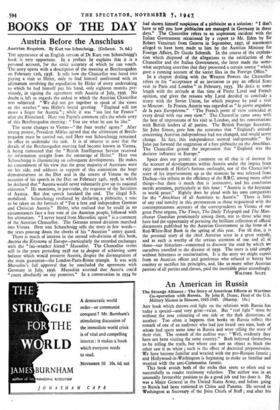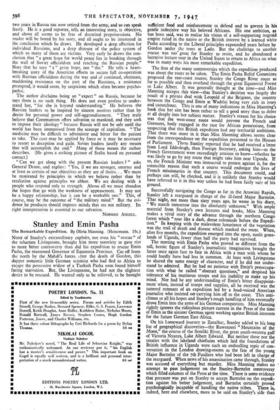An American in Russia
The Strange Alliance : The Story of American Efforts at Wartime Co-operation with Russia. By John R. Deane, Head of the U.S. Military Mission in Moscow, 1943-1945. (Murray. 18s.) ANY book which throws real light on the relations with Russia has today a special—and very grim—value. But " real light " must be without the rose colouring of one side or the dark distortions of another. Too often it happens that books on Russia reflect the remark of one of an audience who had just heard two men, both of whom had spent some time in Russia and were telling the story of their visit. The remark of the auditor was : " Well, evidently they have not been visiting the same country." Both believed themselves to be telling the truth, but where one saw an object as black the other saw it as white ; such is the effect of doctrinal prepossession. We have become familiar and wearied with the pro-Russian fanatic ; and Hollywood-in-Washington is beginning to make us familiar and wearied with- the anti-Communist fanatic.
This book avoids both of the rocks that seem so often and so successfully to render testimony valueless. The author was in an unusually favourable position to do a good job and has done it. He was a Major General in the United States Army, and before going to Russia had been stationed in China and Panama. He served in Washington as Secretary of the Joint Chiefs of Staff ; and after his two years in Russia nas now retired from the army, and so can speak freely. He is a good reporter, tells an interesting story, is objective, and above all seems to be free of doctrinal prepossessions. No reader will be bored by his story, and all ought to be interested in the conclusion which he draws. He developed a deep affection for individual Russians, and a deep distrust of the police system of which so many of them are victims. Very early he draws the con- clusion that " a great hope for world peace lies in breaking through the wall of Soviet officialdom and reaching the Russian people." Note that he says " a " great hope, not " the." He tells a heart- breaking story of the American efforts to secure full co-operation with Russian officialdom during the war and of continual, obstinate, maddening resistance on the part of the Russians, a resistance prompted, it would seem, by suspicions which often became psycho- pathic.
The author disclaims being an " expert " on Russia, because he says there is no such thing. He does not even profess to under- stand her, " for she is beyond understanding." He believes the Russian leaders to be inspired by sincere motives rather than by desire for personal power and self-aggrandisement. " They truly believe that Communism offers salvation to mankind, and they seek to impose their ideology " because Russia will not be safe until the world has been immunised from the scourge of capitalism. " The medicine may be difficult to administer and bitter for the patient to take. The cure may be applied by force or it may be necessary to resort to deception and guile. Soviet leaders justify any means that will accomplish the end." Many of those means the author describes. (He gives a striking picture of Stalin based on personal contact.) " Can we get along with the present Russian leaders ? " asks General Deane, and replies: " Yes, if we are stronger, smarter and at least as certain of our objectives as they are of theirs. .. We must be motivated by principles in which we believe rather than by retaliation against principles we abhor. We are dealing with a people who respond only to strength. Above all we must abandon the hopes that go with the weakness of appeasement. It may not be a happy relationship, but it can be a workable one." This, of course, may be the outcome of " the military mind." But the evi- dence he produces should impress minds that are not military. Its right interpretation is essential to our salvation.
NORMAN ANGELL.



































 Previous page
Previous page